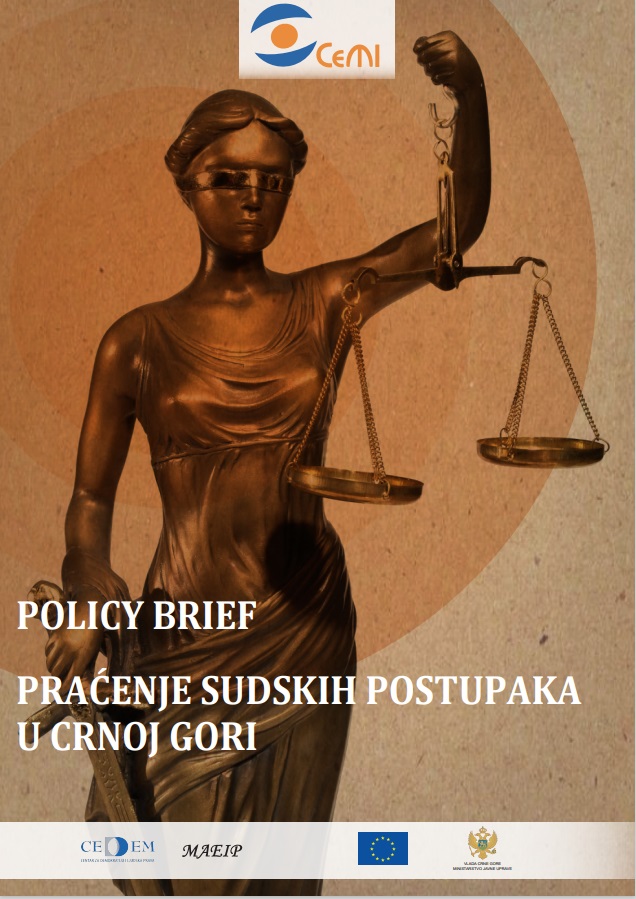The Centre for Monitoring and Research (CeMI), in collaboration with the Center for Democracy and Human Rights (CEDEM) and the Network for the Affirmation of European Integration Processes (MAEIP), supported by the European Union and the Ministry of Public Administration, is executing a project titled "Judicial Reform: Enhancing Civil Society Organizations' Capacity to Uphold Judicial Integrity" (hereinafter referred to as the Project).
The project aims to bolster the rule of law in Montenegro by enhancing the professionalism, accountability, efficiency, and integrity of the judiciary. This objective will be achieved through fostering closer collaboration and more effective mechanisms between civil society organizations and judicial institutions. The project's focus is on bolstering local organizations' capabilities and increasing civil society engagement in Montenegro's judicial system reforms, as well as negotiations pertaining to Chapter 23 (judiciary and basic human rights). A pivotal project activity entails monitoring court proceedings across Montenegro. Trial monitoring adheres to the OSCE's methodology, developed jointly by CeMI and the OSCE Mission to Montenegro during the trial monitoring program from 2007 to 2014.
During the reporting period, which constitutes the second year of project implementation, CeMI and CEDEM observers monitored 642 cases. In the initial reporting phase, they scrutinized 150 cases (263 main trials) by attending trials, and their findings were encapsulated in the first annual report on monitored trials for the preceding year. Subsequently, observers monitored 492 cases by reviewing criminal case files in all basic and higher courts in Podgorica and Bijelo Polje. Court proceedings monitoring adheres to the principles outlined in the Memorandum on Cooperation inked between the Supreme Court of Montenegro, CeMI, and CEDEM at the project's inception. In addition to two annual reports, CeMI published reports and policies on trials in a timely manner, covering the application of plea agreements and the activities of public bailiffs.
In collaboration with the PR center, CeMI produced two annual reports assessing media compliance with the presumption of innocence when reporting on court proceedings. Furthermore, the project supported six initiatives by local civil society organizations (Action for Human Rights, European Youth Center, Media Union, Center for Political Education, Society of Professional Journalists of Montenegro, Association of Disabled Youth of Montenegro) and organized four seminars for their representatives to bolster capacities in judicial reform.
Additionally, 20 in-depth interviews were conducted with judicial authorities, and two public opinion surveys were undertaken. Finally, an internet and media campaign disseminated the most pertinent research findings and aspects of judicial reform. Through such trial monitoring initiatives, civil society organizations enhance their capacity to monitor court proceedings professionally and in line with international standards, focusing on the reliability of their reporting to relevant national and international bodies.
The observed standards of the right to a fair trial encompassed respect for the presumption of innocence, the rights of suspects/accused individuals and detainees, the right to an interpreter, trial timeliness, judicial independence and impartiality, truth and fairness principles, public hearings, public sentencing, the right to defense, trial expeditiousness, and the conduct of the court and other participants in criminal proceedings. Aligning with the methodology and principles of trial monitoring across numerous European nations, CeMI and CEDEM observers consistently adhered to the principles of monitoring court proceedings within this project: non-interference, objectivity, and consent, with certain limitations inherent to trial monitoring programs, which are also delineated.
The focus of monitoring was criminal proceedings, achieved through case file inspections and attendance at main trials. Random case selection constituted the primary monitoring method (100% in case file inspections), with targeted sampling exceptionally conducted through attendance at searches in cases of significant public interest, particularly those related to organized crime, corruption, terrorism, electoral rights violations, human trafficking, and war crimes (attendance at main trials). Observers predominantly monitored cases in higher courts in Podgorica (118 cases - 18.38%) and Bijelo Polje (41 cases - 6.39%), as well as basic courts in Podgorica (116 cases - 18.07%) and Niksic (44 cases – 6.85%). Case file inspections covered cases legally concluded between 2016 and 2019.
This policy brief aims to summarize the significant findings reached by CeMI and CEDEM observers through court proceedings monitoring activities, with the objective of evaluating Montenegro's judicial practice adherence to both domestic legislation and international standards of fair trial rights. Conclusions and preliminary recommendations, integral to the brief, suggest pertinent institutions undertake appropriate measures to achieve a fair and efficient judicial system in Montenegro, based on identified shortcomings.
